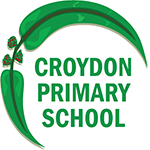Senior School 5-6
LITERACY
Café Reading and Literature Groups
In the senior school our students use Café Reading. Café stands for – Comprehension, Accuracy, Fluency and Expand Vocabulary. Students choose “Good Fit Books” that relate to their reading ability. They work on the strategies that have been identified as their individual goal through conferences with their teacher.
Explicit guided reading lessons still take place as teachers put emphasis on the student’s comprehension.
Students are extended through Literature groups where the group all read the same title leading to guided discussions and critical thinking around the text.
Writers’ Notebooks
At Croydon Primary school we teach the writer rather than writing.
The Writers’ Notebook approach is used to allow students to take ownership of what they write and develop their ideas with teacher support. Rather than everyone in the class writing he same thing at the same time, our students have developed a love of writing through teacher conference support and individual idea development.
An important component of the Writing Workshop approach is the Writer’s Notebook which creates a place for students (and writers) to save their words—in the form of a memory, a reflection, a list, a rambling of thoughts, a sketch, or even a scrap of print taped on the page.
The notebook serves as a means to encourage young writers to value writing, where ‘seeds’ for a longer writing project require revisiting and rereading to locate ‘a phrase, a paragraph, a page’ which might be expanded and developed.
The generation of ideas is only the beginning. It is the teacher’s role to support the extension and elaboration of the ‘seeds’ which might become a more detailed plan, a draft or a published text.
While not all ideas will be seen through to a ‘final’ copy, it is the role of the teacher to monitor students’ writing to ensure experiences which progress their writing through the various processes of writing, and across a range of text types, are provided each term and across the school year.
Some key points about the Writer’s Notebook
- A writer’s notebook is a tool students use to record the things they notice, observe, and think about. Children write best about the things that are important to them and what they are interested in. It is writing that comes from what they know and what they have experienced.
- A writer’s notebook houses ideas that writers can return to in order to grow ideas, restructure, rethink, revise, connect ideas and ultimately choose from a variety of entries to publish for an audience. It supports the work of publishing.
- Notebook writing encourages a writer to take to the ‘long view’. What might start off as a small undeveloped idea has the potential to be developed into something fully formed.
- Students need daily sustained periods of time to write. The writer’s notebook helps give direction to those sustained times for writing, especially early in the year when establishing a classroom community that will support students’ writing throughout the year.
Spelling
Spelling is explicitly taught each day in Structured Word Inquiry (scientific word investigation) sessions that teach the students about the origins of words, the meaning of the base word and adding prefix and suffixes.
The method is based on:
*the primary function of English spelling is to represent meaning
*the conventions by which English spelling represents meaning are so well0-ordered and reliable that spelling can be investigated and understood through scientific inquiry.
The following are the standard four questions used to guide SWI investigations. 1.What does the word mean?
2.How is it built?
- Can you identify any bases or affixes with a word sum?
3.What other related words can you think of?
- Morphological relations: Can theWord Searcherhelp you find words that could join your word on a matrix?
•Etymological relations: Can a word origin dictionary (e.g. Etymonline) help you?
4.What are the sounds that matter?
- What grapheme/phoneme correspondences can you find that fit within your hypothesized morphemes?
We have had wonderful success since introducing this method with our NAPLAN results showing improved spelling and the students reading and writing improving from their understandings.
MATHEMATICS
Croydon Primary School has an emphasis on the mathematics program being linked to real life experiences. Students study the ‘big ideas” in mathematics to ensure a solid foundation. In the Senior school this is particularly , Multiplicative Thinking, Partitioning and Proportional Reasoning.
Hands on activities ensure engagement and greater understanding of all mathematic concepts.
Senior school students further develop their problem solving abilities using “Task Boxes” allowing them to work in a team, hypothesise over possible solutions and articulate their reasoning.
INTEGRATED STUDIES
Areas of the curriculum such as Science, Geography, History, Health and Design Technologies are taught each term within an inquiry unit that puts the work into a real life context. We believe these concepts are understood better within a term unit rather than “one off” lessons.
Within these units intercultural, personal and social capabilities and critical and creative thinking are woven into the explicit teaching, inquiry and tasks the students complete.
ICT
All students have access to class sets of iPads and Notebook computers. Students use these when they are the best tool for the activity and to learn specific ICT skills.
“Spheros” are used to teach coding and 3D printers have been recently implemented.
